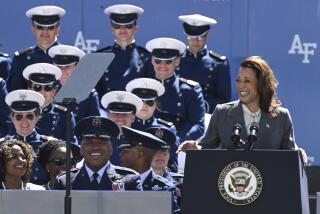Reagan to Send Shultz to Moscow; Carlucci Sees Chance of Summit
- Share via
WASHINGTON — President Reagan, seeking to “maintain the momentum” toward an arms agreement, said today he will send Secretary of State George P. Shultz to Moscow next month for talks a top aide said could lead to a U.S.-Soviet summit this year.
The announcement, read by new national security adviser Frank Carlucci, came after Reagan met with the three U.S. arms negotiators he called home from Geneva to discuss details of an agreement that would ban nuclear missiles from Europe.
Chief negotiator Max Kampelman said, “We do have a good shot at an agreement” on the intermediate nuclear forces--or medium-range missiles--that both sides have installed in Europe but have been unwilling to seriously bargain on for five years.
Carlucci said the April 13-16 talks between Shultz and Soviet Foreign Minister Eduard A. Shevardnadze “will provide a good opportunity to review the entirety of our relationship, including regional conflicts, human rights and bilateral issues and to consolidate the progress we have made.”
Summit a Possibility
Asked if the Shultz-Shevardnadze meeting could lead to fulfilling Soviet leader Mikhail S. Gorbachev’s 1985 Geneva summit promise to visit the United States this year, Carlucci said: “I’m sure this is one of the things the foreign ministers will discuss when they meet.
“If there’s progress and . . . developments look promising, that would certainly be a possibility.”
Carlucci said he hopes the Shultz-Shevardnadze meeting “will result in recommendation on further steps we might take to move forward in all aspects of our relations, including the Geneva negotiations.
“The level, intensity and seriousness of the effort in Geneva have brought us closer to significant reductions in nuclear arms,” Carlucci said.
Returned to October Formula
The two sides returned this week to the INF formulation accepted at the Reagan-Gorbachev summit at Reykjavik last October.
Under that agreement, both sides would reduce the number of missiles to zero in Europe, with the Soviets allowed 100 in the Asian portion of their land mass and the United States allowed 100 in its territory, most likely Alaska.
In Reykjavik, however, the Soviets insisted that any arms agreement be tied to a limit on U.S. research, testing and development of a space-based defense system against strategic missiles, which Reagan flatly rejected.
Kampelman said that Gorbachev’s speech last week dropping demands for limits on Reagan’s Strategic Defense Initiative as a condition for eliminating nuclear missiles in Europe “interested us immensely.”
Objected to Deployment
He said Gorbachev limited his objections only to deployment of the “Star Wars” space shield, not to the research and development phases the Soviets had previously been protesting.
More to Read
Sign up for Essential California
The most important California stories and recommendations in your inbox every morning.
You may occasionally receive promotional content from the Los Angeles Times.












